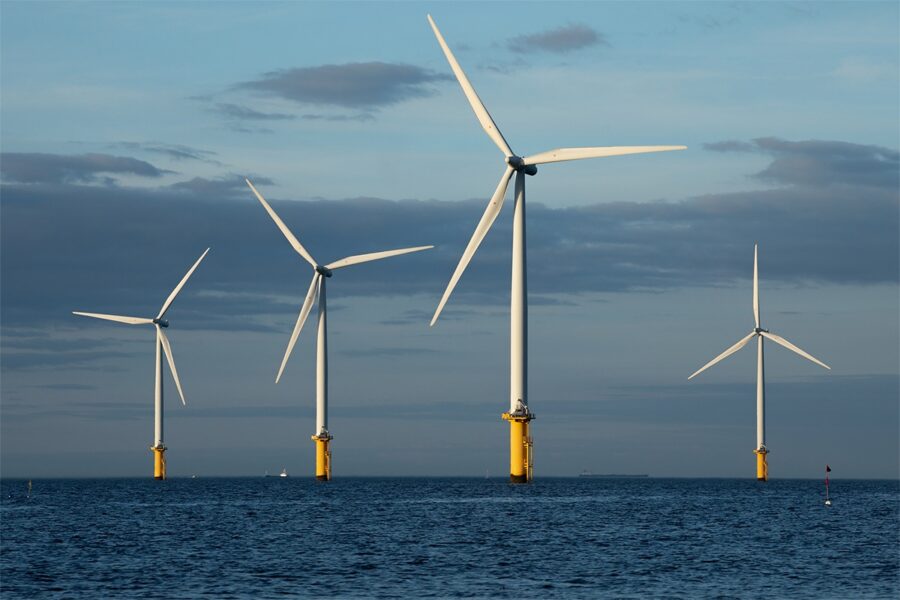Scottish industry leaders laid out the challenges facing the industry from the rapid development of offshore wind farms and the pressures on the inshore sector in a ‘very constructive’ meeting last week with the minister responsible for both energy and inshore fisheries.
The North East of Scotland Fisheries Development Partnership (NESFDP) met Gillian Martin, Scottish minister for energy and the environment, who represents Aberdeenshire East.
Chair of the meeting was Ann Bell, who highlighted the remit of the NESFDP and its joint working with the North Sea Commission Marine Group on issues of common concern and good practice such as co-existence between fishing and other users of the North Sea and local communities.
She said this was particularly resonant as the minister made mention of meetings she had recently attended in Denmark where the importance of working with partners is seen as a high priority.
Mrs Bell said: “We were delighted that the minister took the time to meet with us and for confirming her wish to attend a meeting of the partnership in the New Year.”
SFF chief executive Elspeth Macdonald, who is also vice-chair of NESFDP, set out the challenges that the fishing sector faces due to spatial pressures at sea, especially from the expansion of offshore wind developments, noting the potential impacts not just on fishermen, but also on shore-based parts of the seafood supply chain.
She told Fishing News: “The minister is fairly new in the job and was keen to listen to us and hear our views.
“She is also an Aberdeenshire MSP, so her constituency is within the patch of the partnership.
“I think she does appreciate the industry’s concerns over spatial squeeze and the growth of wind farms. She worked in the energy sector in the North East of Scotland before she went into politics, so I think that’s helpful – I think she understands a lot of that context.
“We talked about some of the other issues, not just the spatial pressures. We also talked about the legacy of these wind farms, and that once you have constructed these things, we don’t really know what their cumulative impact will be in the longer term.”
Elspeth Macdonald said the fact that the minister had been to Denmark talking to people about their experiences of building wind farms and the data they have been gathering indicated that she was engaging with the issues and the need to balance the opportunities of renewable energy with the impact on other sectors.
Noting that the minister’s remit straddled both energy and inshore fisheries, she said the meeting had also discussed the challenges facing the inshore sector, including the Scottish government’s shelved HPMA proposals and ‘the narrative we often hear about the inshore from some of the NGOs’.
“The language in their programme for government published at the beginning of December talks about community-led approaches to enhance marine protection, but we haven’t begun to see the detail of what is in their minds yet,” said Elspeth Macdonald.
“But it’s clear that their HPMA approach wasn’t one that had much support, and that they need to do something differently.
“We also talked about the importance of not forgetting about the inshore stocks when we’re thinking about science and research needs. There is particular concern around brown crab – effort is going up, but catches are going down, so we don’t have a lot of time to decide what we need to do.”
She said the minister was keen to understand the specific concerns of the industry. “There were a couple of things she said she would like to discuss in a bit more detail, and she said she would follow up if we wrote to her, so for an introductory meeting it was a good start.”
She said with no election due in Scotland until 2026, the industry was hoping for a period of political stability, ‘though how long the coalition with the Green Party survives, and whether it will last until the election, remains to be seen’.
Andrew Brown, vice-chair of the Scottish Seafood Association (SSA) and NESFDP, said: “This was an excellent initial opportunity to raise with the minister issues impacting inshore fisheries which directly affect fishing communities and local fish processors.
“The minister was keen to engage further with these concerns, and I look forward to engaging with her further through both the NESFDP and SSA.”
Gillian Martin said she was pleased to have had the opportunity to engage with representatives of local councils, the seafood industry and communities through the NESFPD.
“The Scottish government values Scotland’s fishing sector and the important economic and social role it plays, particularly in rural and island communities,” she said.
“And we know that more than any of us, the people and businesses involved in fishing value and understand the importance of protecting and enhancing our marine environment, not least for the benefit of future generations.
“Constructive engagement and co-operation is vital as we work to deliver a blue economy that benefits our communities, economy and environment. This meeting is, I hope, the first of many as we continue to work together to achieve this.”
This story was taken from the latest issue of Fishing News. For more up-to-date and in-depth reports on the UK and Irish commercial fishing sector, subscribe to Fishing News here or buy the latest single issue for just £3.30 here.
Sign up to Fishing News’ FREE e-newsletter here.








